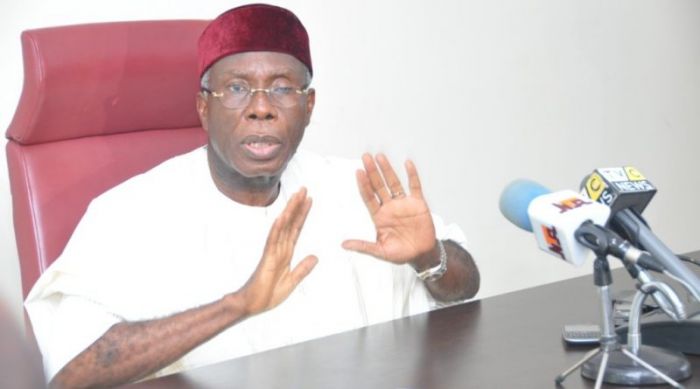- Oil, Gas Era Gone, Says Ogbeh
The Federal Government has explained that with its agricultural export programme, the era of oil and gas is gone.
The Minister of Agriculture and Rural Development, Chief Audu Ogeh, who stated this in an interview with journalists on Thursday night in Abuja, said Nigeria needed dollars from agricultural exports to repay its loans.
He stated that the country would be in a serious trouble if it failed to earn between $10bn and $15bn from agriculture by 2020 because the loans would be due for repayment.
The Federal Government has taken $4.8bn foreign loan in the last two years, while domestic loans during the period stand at N3.58tn. It also borrowed N3.57tn to finance budget deficits during the period.
Painting a gloomy picture of the economy, the minister said the country needed to embark on massive agricultural production and exports.
Ogbeh, who defended the government’s yam export policy, said Nigerians should stop waiting for a return of the glorious era of crude oil.
He stated, “India announced two weeks ago that by 2030, there will not be a single car produced or brought into India using diesel or petrol. They will all be electrical. Germany is passing a law that by 2030, no hydrocarbon in the country. The French are wiring their highways; as vehicles pass, they generate electricity in dynamo and batteries. The United States is doing shale oil. The Chinese will soon start their own.
“If we are waiting for oil and gas hoping that the era will come back, none of you in another six or seven years will be a happy human being, because we do not have money and we are borrowing heavily. How do we repay the loans in dollars?”
He added that there were 60 varieties of yams in the country, noting that if Ghana could be exporting the produce, nothing should stop Nigeria.
According to him, many of the yams being exported from Ghana to the United Kingdom are bought by Lebanese and Indians from Nigeria.
Ogbeh said that 30 per cent of yams grown in Nigeria rot away because the country had no facilities for their preservation.
He stated, “The yam market is worth $10bn globally. Why shouldn’t we be part of it? We embarked on these things because we have the capacity to do so and because the demand for our produce abroad is very high.
“We need to be bold in what we are trying to do. The final word on it is that if there is such demand, rather bemoan the export, let us grow more yams. We have 45 million hectares of land lying fallow. So what are we afraid of?”
He said that there were about five million Nigerians in the United Kingdom looking for yams.

 Forex2 weeks ago
Forex2 weeks ago


 Naira2 weeks ago
Naira2 weeks ago
 Billionaire Watch1 week ago
Billionaire Watch1 week ago




 Naira2 weeks ago
Naira2 weeks ago




 Naira1 week ago
Naira1 week ago




 Naira4 weeks ago
Naira4 weeks ago
 Nigerian Exchange Limited4 weeks ago
Nigerian Exchange Limited4 weeks ago


 Naira3 days ago
Naira3 days ago
















